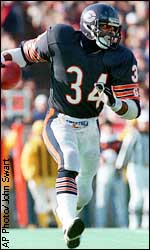 |
|
| | Wednesday, November 3 | |||||
Special to ESPN.com | ||||||
| We all carry snapshots of our loved ones in the wallet of our mind's eye. Grandparents, long lost, are bright-eyed and strong. Parents are wise and caring, children smiling and maybe slightly mischievous. We do not see -- we do not allow ourselves to dwell on -- their frailties and flaws.
I chose to see him, to remember him, this way: It is the early '80s and Payton is in a place as comfortable to him as the womb. He is floating six inches above the frozen turf at Soldier Field, hovering really, splay-legged and open to suggestion. Payton's eyes are wide, deer-caught-in-the-headlights wide. But this wild creature, crackling with that quirky, impulsive energy, is very much in control of the moment. The safety, whose job it is to decide which way Payton will go when he finally comes down, is the one who looks stunned and, perhaps, a little frightened. In truth, it is the defender who determines where Payton is going by committing, ever so slightly, to his right. Payton touches down, leans almost imperceptibly left and cuts hard to the right. The safety catches nothing but a lot of air. Payton, blasts of breath pluming through the facemask of his helmet, pressing the ball against the 3 of the No. 34 on his jersey, is eventually brought down. But not without a struggle. It is a cardinal rule of sport not to elevate under duress. The conventional wisdom is that leaving your feet limits your options. With Payton, the reverse was true. When he was airborne, Payton was supremely confident and seemingly invulnerable. Frank Caito, the Bears' former trainer, used to say the secret of Payton's success was his "big butt." He meant it, too. Payton's formidable gluteus maximus muscles were the source of his power. Caito was convinced it not only protected him from abusive hits, but also allowed him to lift his legs a little higher than the average Bear. Still, this only partially explains how a man named "Sweetness" managed to carry the football 3,838 times for 16,726 yards, NFL records both, and played in 189 of his team's 190 games in 13 seasons from 1975-87. Payton was, contrary to his name, a heroically tough runner. He did not, as we so often see today, veer out of bounds when a tackler presented himself. Payton would lower his head and drive away from the sideline. For the majority of his career in Chicago, the Bears approached awful more often than not. There were only two winning seasons in Payton's first nine before coach Mike Ditka turned the franchise around. It was typical of Payton's under-appreciated career that when he finally reached the league's ultimate game, Super Bowl XX in New Orleans, he was overshadowed. Quarterback Jim McMahon, of all people, scored two rushing touchdowns in the Bears' 46-10 blowout of the New England Patriots. In the third quarter, Ditka lined up defensive tackle William "The Refrigerator" Perry in the backfield and he scored from a yard out. Defensive end Richard Dent was the game's Most Valuable Player and wide receiver Willie Gault caught four passes for 129 yards. But the Patriots' fascination with Payton, who carried 22 times for a modest 61 yards, allowed all of those other things to happen. In 1984, when Ditka ran out of quarterbacks -- McMahon, Rusty Lisch, Steve Fuller, Bob Avellini and Greg Landry -- he asked Payton to step under center. He threw eight passes, completing two for touchdowns. In his career, he threw 34 times, completing eight for scores. Payton was not as powerful as the combustion engine known as Jim Brown, who led the NFL in rushing eight of nine seasons. Payton only led the league once, in 1977, with an amazing 1,852 yards and 14 touchdowns in a 14-game schedule. He was not as breathtaking to behold as Barry Sanders, who despite retiring this season with 15,269 career yards might one day break Payton's all-time record. Payton was no match for O.J. Simpson or Earl Campbell in the venue of charisma. Payton was merely, consistently, great. In a day when 1,000-yard seasons are commonplace, Payton and Sanders remain the only runners to do it 10 times. And there wasn't a cheap 1,000 among the bunch; Payton's worst 1,000-plus season was in 1981, when he carried a 6-10 team with 1,222 yards.
Like Hank Aaron, who never hit 50 home runs in a season but wound up with more (755) than anyone, Walter Payton ran better, more often and for longer than any of his marquee peers in the Pro Football Hall of Fame. It doesn't get any sweeter than that. | ALSO SEE Payton, NFL's career rushing leader, dies at 45
Video tribute to Walter Payton
Ditka mourns Payton's loss, remembers his life
Reaction to the death of Walter Payton
Walter Payton career statistics
Walter Payton career highlights
| |||||

